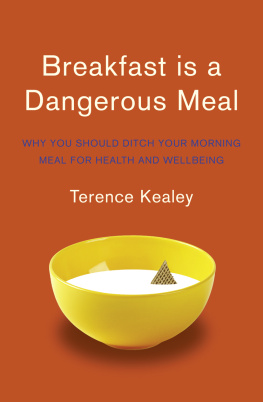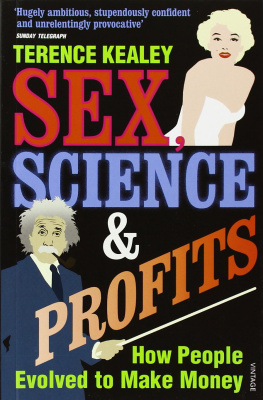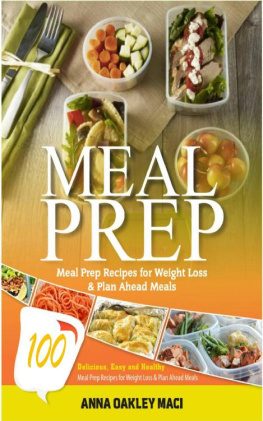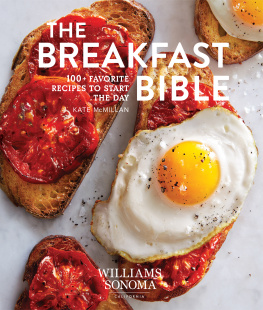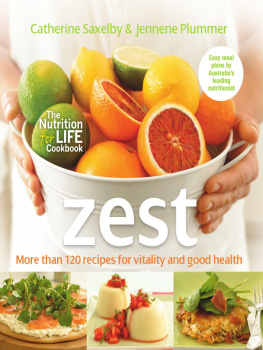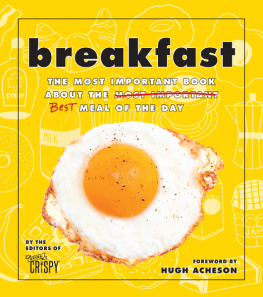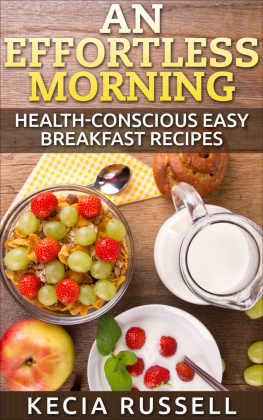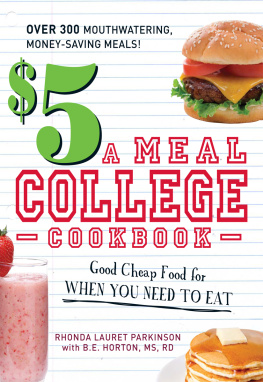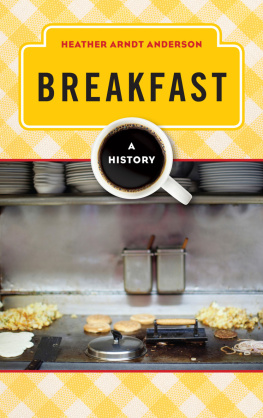Terence Kealey - Breakfast is a dangerous meal : why you should ditch your morning meal for health and wellbeing
Here you can read online Terence Kealey - Breakfast is a dangerous meal : why you should ditch your morning meal for health and wellbeing full text of the book (entire story) in english for free. Download pdf and epub, get meaning, cover and reviews about this ebook. year: 2016, publisher: 4th Estate, genre: Science. Description of the work, (preface) as well as reviews are available. Best literature library LitArk.com created for fans of good reading and offers a wide selection of genres:
Romance novel
Science fiction
Adventure
Detective
Science
History
Home and family
Prose
Art
Politics
Computer
Non-fiction
Religion
Business
Children
Humor
Choose a favorite category and find really read worthwhile books. Enjoy immersion in the world of imagination, feel the emotions of the characters or learn something new for yourself, make an fascinating discovery.
- Book:Breakfast is a dangerous meal : why you should ditch your morning meal for health and wellbeing
- Author:
- Publisher:4th Estate
- Genre:
- Year:2016
- Rating:5 / 5
- Favourites:Add to favourites
- Your mark:
- 100
- 1
- 2
- 3
- 4
- 5
Breakfast is a dangerous meal : why you should ditch your morning meal for health and wellbeing: summary, description and annotation
We offer to read an annotation, description, summary or preface (depends on what the author of the book "Breakfast is a dangerous meal : why you should ditch your morning meal for health and wellbeing" wrote himself). If you haven't found the necessary information about the book — write in the comments, we will try to find it.
Terence Kealey: author's other books
Who wrote Breakfast is a dangerous meal : why you should ditch your morning meal for health and wellbeing? Find out the surname, the name of the author of the book and a list of all author's works by series.
Breakfast is a dangerous meal : why you should ditch your morning meal for health and wellbeing — read online for free the complete book (whole text) full work
Below is the text of the book, divided by pages. System saving the place of the last page read, allows you to conveniently read the book "Breakfast is a dangerous meal : why you should ditch your morning meal for health and wellbeing" online for free, without having to search again every time where you left off. Put a bookmark, and you can go to the page where you finished reading at any time.
Font size:
Interval:
Bookmark:
Contents
Australia
HarperCollins Publishers (Australia) Pty. Ltd.
Level 13, 201 Elizabeth Street
Sydney, NSW 2000, Australia
http://www.harpercollins.com.au
Canada
HarperCollins Canada
2 Bloor Street East 20th Floor
Toronto, ON, M4W, 1A8, Canada
http://www.harpercollins.ca
New Zealand
HarperCollins Publishers (New Zealand) Limited
P.O. Box 1
Auckland, New Zealand
http://www.harpercollins.co.nz
United Kingdom
HarperCollins Publishers Ltd.
1 London Bridge Street
London, SE1 9GF
http://www.harpercollins.co.uk
United States
HarperCollins Publishers Inc.
195 Broadway
New York, NY 10007
http://www.harpercollins.com
Challenging the consensus on breakfast has not always been easy, and I might never have completed this project but for the help of my friends. My first thanks go to the medical and nursing staff at the Swan Practice in Buckingham, who not only looked after me so well but who also inspired this book by providing me with a glucometer (or glucose meter) that, to my surprise, revealed that breakfast was for me a dangerous meal.
Second, I thank my good friend the late Professor Mike Cawthorne, the professor of biochemistry at the University of Buckingham, who told me that everything the NHS, NICE [the National Institute for Health and Care Excellence] and the diabetes charities say about carbohydrates is of course wrong. I also thank Julie Cakebread and Eddie Shoesmith of the University for their scientific input into this book. My other friends at Buckingham are legion, but sadly they work within non-breakfast-relevant disciplines, so I cannot name them here.
Third, I thank Professor Sir Christopher Edwards FMedSci, whose houseman I was back in 1976, who told me of other discoveries that contradicted NICEs guidelines and who encouraged me to be sceptical of official advice.
Fourth, I thank my old friend Professor Roy Taylor of Newcastle University, who has long seen through the breakfast propaganda and who was kind enough to read some of the chapters of this book at an early stage. Any mistakes that have survived are of course solely mine, but thanks to Roy there are fewer of them.
Three people who have always supported my science writing are Matt Ridley, Nassim Taleb and Professor David Edgerton of Kings College London, and Im happy to thank them here. I have, moreover, breakfast-insightful friends at the Cato Institute in Washington, DC, with whom I spent most of 2016, and I thank Roshni Ashar, Chip Knappenberger, Pat Michaels, Guillermina Sutter and Joe Verruni for all their help.
My wife, Sally, has been my best support; shes read draft chapters and spotted interesting articles in the newspapers, and Im so happy not only to thank her but also to dedicate this book to her. I also thank Helena and Teddy, our children, for tolerating my lectures over their breakfasts and sugary indulgences.
This book was hugely improved by Louise Haines from 4th Estate, and I thank her, David Roth-Ey (who is very sound on breakfast) and Sarah Thickett for all that they did: they were great. I also thank Jamie Keenan for a terrific cover and Felicity Bryan for being a superb agent.
TERENCE KEALEY trained in medicine at Barts Hospital Medical School, University of London (197076) ahead of moving to Oxford for a PhD in clinical biochemistry. From Oxford he moved to the University of Newcastle before, via a Wellcome Senior Clinical Research Fellowship, lecturing in clinical biochemistry at Cambridge (19862001). Between 2001 and 2014 he was Vice Chancellor of the University of Buckingham, and he is now a visiting scholar at the Center for the Study of Science at the Cato Institute, Washington, DC, where he is focusing on food policy.
On 28 August 2016, the day after I delivered the final version of this book to the copy editors, I was alerted by a friend to a story in that days Daily Mail headlined: Could six meals a day keep heart disease at bay? Regular eating found to reduce the chance of dying from clogged arteries by 30%.
It wasnt hard to find the original paper, which had just been published by a team from Johns Hopkins University (a prestigious university in Baltimore, MD) in the Annals of Epidemiology, and which reported on the health of nearly 7,000 people who had been followed over fifteen years. Some of those people happened to eat only once or twice a day, while others happened to eat up to six times a day; and those who ate more often, lived longer.
Yet those who lived longer differed in many ways from those who died earlier, including being older, more female, much whiter, much less black or Hispanic, and markedly better educated.
The authors tried to correct for these and other factors, but they obviously failed because the biology is so complex. Thus the six-times-a-day eaters ate 758 calories more every day than the two-times-a-day eaters, which is clearly unhealthy, so their longevity will have been despite not because of their eating breakfast and other gratuitous meals.
As Ive noted before, this sort of study only confirms what Michael Marmot established long ago, namely that in the west the upper socio-economic groups outlive the lower groups by And since the upper groups tend to eat breakfast and other regular meals, while the lower groups tend to eat less regularly, the Johns Hopkins study had really only shown a correlation not a causation between frequent eating and longevity.
When I emailed the Johns Hopkins researchers, they were gracious enough to acknowledge that: This is an observational study, so we couldnt know about actual cause-and-effect until someone had done a randomized controlled trial. Which is why the Daily Mail might have done better to have headlined the article:
Could six meals a day keep heart disease at bay? We dont know, but probably not.
And with that final retrospect, I will finish this book.

On 24 May 2010 my wife drove me to our family doctors surgery and told me not to emerge without a diagnosis. Over the previous two or so months I had started to feel increasingly thirsty, and I had not only started to drink water all day but I had also started to pee all day. And all night. I was losing weight, my muscles were wasting away with a strange crackling ache, and I felt tired all the time. I even woke in the morning feeling tired. Clearly, my wife said, I had developed diabetes, and she was irritated by my assurances that if we ignored the symptoms they might go away. So it was she who made the appointment to see our doctor, and it was she who drove us to the surgery to ensure I kept it.
I told my doctor what was happening and, echoing my wife, he said it sounded a bit like diabetes. I was forced to agree. So he performed a spot urine test, and there it was glucose in my urine (sugar in the water, as he put it). I was diabetic. He then sent a blood sample to the lab, which shortly revealed a fasting blood glucose level of 19.3 mmol/l (normal range 3.9 to 5.5) and an HbA1c of 13.3 per cent (normal range 4 to 5.9; see later). I was very diabetic indeed. Type 2.
My story should thereafter have been routine. Thanks to a good wife and a good doctor a correct diagnosis had been made, and I was surely on the road to recovery. But I was then told to eat breakfast.
It is universally respected, both for its research and for its support for patients. Here is some dietary advice from its
Next pageFont size:
Interval:
Bookmark:
Similar books «Breakfast is a dangerous meal : why you should ditch your morning meal for health and wellbeing»
Look at similar books to Breakfast is a dangerous meal : why you should ditch your morning meal for health and wellbeing. We have selected literature similar in name and meaning in the hope of providing readers with more options to find new, interesting, not yet read works.
Discussion, reviews of the book Breakfast is a dangerous meal : why you should ditch your morning meal for health and wellbeing and just readers' own opinions. Leave your comments, write what you think about the work, its meaning or the main characters. Specify what exactly you liked and what you didn't like, and why you think so.

